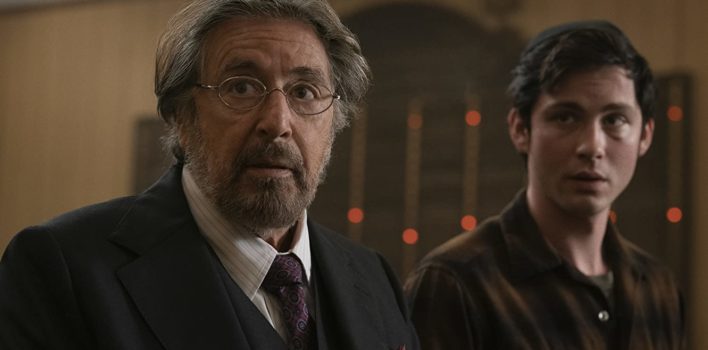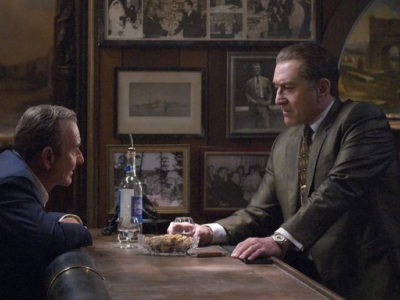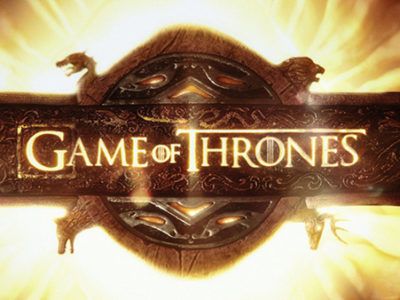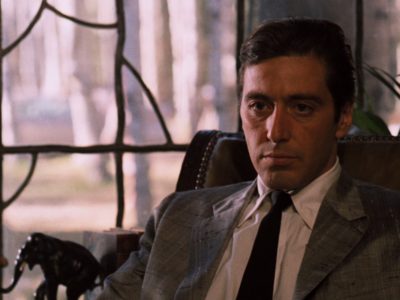The Complicated Vengeance of Hunters
Nazis! Groovy Assassins! Al Pacino!
What happens when you take the motives and violence of Taranitino’s Inglourious Basterds and mix it with the revelry and twisted humor of The Boondock Saints?
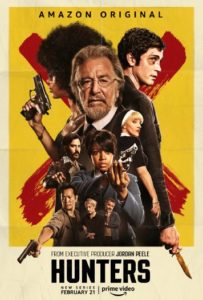 You get Hunters. And it’s glorious.
You get Hunters. And it’s glorious.
I will keep this review spoiler free, but it’s better to watch Hunters knowing as little about it as possible. If you haven’t seen it yet, please go watch the first few episodes and read this later.
Usually I don’t know what to watch when I look at the overwhelming selection that Amazon Prime offers, so it was somewhat serendipitous that I even saw the first episode of Hunters.
Shocking you into attention, this show either grabs you instantly or makes you scramble for the remote whilst blurting out a nervous “maybe we should try something else, honey!” It’s violent, it’s irreverent, and it’s a whole lotta fun. Sarcastic and pointed, the series thrusts us into the unpredictably dangerous world of groovy 1977, where we follow the trials of young Jonah (Logan Lerman), a gifted Jewish twentysomething trying to navigate his feelings of loss and his thirst for revenge. Meyer (Al Pacino) and his quirky ensemble of assassins and miscreants propel our hero on a path of vengeance and self-discovery. Dark and sarcastic in tone, this series is a striking example of clever writing and comic book style shenanigans coming together to make a compelling story.
Hunters is compelling in its sincerity, whether you like it or not.
But it’s not all dark and twisted fun. There’s plenty of violence, yes, and also plenty of foul language, drugs, violence, some nudity, some more violence, and lots of holocaust flashbacks (mercifully, these are not as horrific as they could be). The tone of this show is shifting and sometimes disorienting; one minute you’re witnessing a weird drug induced singalong to The Bee Gees and the next you’re right in the middle of a Nazi death camp frozen with fear.
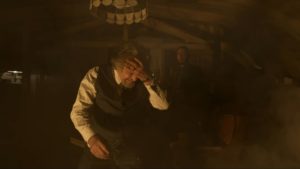 But after 5 minutes of Hunters, I was sold on all of it. The leading man (Lerman) is brooding and convincing, and almost makes me want to go and watch the Percy Jackson movies (almost). Pacino is only one member of an ensemble cast that is full of recognizable B list actors doing their darndest to be very Jewish and very entertaining. It all works well because the premise of this whole series is utterly ridiculous and wholeheartedly engaging. Nazis are here in America, you see, and this group of well-funded and diversely-talented assassins are out to track down and bring the Nazi scum to justice. The Nazis, also well-funded and highly motivated (and, somehow, totally invisible to anyone not looking for Nazis?) are on a crusade to usher in the Fourth Reich, taking out as many Jews and minorities as possible along the way.
But after 5 minutes of Hunters, I was sold on all of it. The leading man (Lerman) is brooding and convincing, and almost makes me want to go and watch the Percy Jackson movies (almost). Pacino is only one member of an ensemble cast that is full of recognizable B list actors doing their darndest to be very Jewish and very entertaining. It all works well because the premise of this whole series is utterly ridiculous and wholeheartedly engaging. Nazis are here in America, you see, and this group of well-funded and diversely-talented assassins are out to track down and bring the Nazi scum to justice. The Nazis, also well-funded and highly motivated (and, somehow, totally invisible to anyone not looking for Nazis?) are on a crusade to usher in the Fourth Reich, taking out as many Jews and minorities as possible along the way.
If you like your action dark and gritty and your drama intense and full of vibrance, Hunters is a solid choice. It’s thoroughly a period piece, with flashbacks of the Second World War and plenty of groovy and wholeheartedly cringy 70s themes, so prepare yourself and your (older and more mature) family for laughs and gasps.
This show is not all camp and violence, however. There are many references to the Bible, the Torah, the Jewish faith, racism, the history of the Hebrews, and reflections on what exactly getting justice really means for survivors of the holocast. Philosophy and theology aren’t always delivered effectively using the medium of television, especially when the show itself refuses to hold to any specific genre or tone.
As you’d expect from a made-for-streaming show, each episode flows into the next, with the finale revealing a bombshell of existential terror and confusion. Personally, I can’t wait for season two, and I really do hope that there is another season. The depth of character development, the intensity of our hero’s motives, and the intrigue of the not too convoluted plot makes Hunters an enjoyable and thoughtful escape from the anxieties of modern reality. It’s hard to feel bad about your own circumstances when you are shown very vivid depictions of the worst atrocities ever committed against humanity. This where the theological value of a program like Hunters is hard to deny.
 Unlike some new shows, Hunters refuses to sell itself as something easily digestible and quickly forgettable. It’s deep yet funny, and speaks to the more existential themes many people and cultures deal with today. Racism and antisemetic ideas are what fueled the hate that led the Nazi party to power. The Nazis blamed almost every other culture and people group who weren’t Germans for the misfortune and mistreatment of their own nation. Other leaders in the past have done and said despicable things in order to maintain power, but Hitler and the Nazi party stand above the rest in their absolute commitment to world domination and hatred of the Jewish people (among many other cultures). Hunters shows no restraint in fully acknowledging the lunacy and commitment to Nazi ideals that the villains share (they are all white, beautiful, ruthless, and creepy).
Unlike some new shows, Hunters refuses to sell itself as something easily digestible and quickly forgettable. It’s deep yet funny, and speaks to the more existential themes many people and cultures deal with today. Racism and antisemetic ideas are what fueled the hate that led the Nazi party to power. The Nazis blamed almost every other culture and people group who weren’t Germans for the misfortune and mistreatment of their own nation. Other leaders in the past have done and said despicable things in order to maintain power, but Hitler and the Nazi party stand above the rest in their absolute commitment to world domination and hatred of the Jewish people (among many other cultures). Hunters shows no restraint in fully acknowledging the lunacy and commitment to Nazi ideals that the villains share (they are all white, beautiful, ruthless, and creepy).
 What’s amazing is that over the course of the show you start to notice beliefs about justice and humanity that are clearly held by both the Hunters and the Nazis. When you hear phrases like “we must eradicate them before they try to destroy the entire world”, it’s hard to recall who said it first or who even said it at all. Killing illegally by hunting down American citizens who may or may not be (but totally are) Nazis isn’t a path to peace, but to the Hunters, the ends justify the means. Murder, lies, deception, torture, terrorism- these are the tactics that both sides use to achieve their goals, with violent and painful consequences. Justice and innocence are both dragged into the spotlight and scrutinized, picked apart, and (often unsuccessfully) defined. Is justice something that a lone man or woman can exact on another, and does it satisfy the injustices done to millions of others? Can innocence ever be regained once darkness and death rip it away?
What’s amazing is that over the course of the show you start to notice beliefs about justice and humanity that are clearly held by both the Hunters and the Nazis. When you hear phrases like “we must eradicate them before they try to destroy the entire world”, it’s hard to recall who said it first or who even said it at all. Killing illegally by hunting down American citizens who may or may not be (but totally are) Nazis isn’t a path to peace, but to the Hunters, the ends justify the means. Murder, lies, deception, torture, terrorism- these are the tactics that both sides use to achieve their goals, with violent and painful consequences. Justice and innocence are both dragged into the spotlight and scrutinized, picked apart, and (often unsuccessfully) defined. Is justice something that a lone man or woman can exact on another, and does it satisfy the injustices done to millions of others? Can innocence ever be regained once darkness and death rip it away?
Our main hero struggles with these issues and more, and his thirst for revenge is overshadowed by the pain he feels when he hurts and kills. Once the likably strong, intelligent, and fearless FBI agent discovers what is happening between the Hunters and the Nazis, she must grapple with the same issues of justice and crime as Jonah. It’s a double sided exploration into right and wrong, dark and light, and it’s compelling enough to carry the story forward effectively.
What makes this work is that Jonah himself is a type of hero we can all relate to. He’s a man who wants to run away from his destiny (like the Jonah of the Bible) but is thrust instead into a struggle between a life of grace and forgiveness and a life of hatred and bitterness. The biblical references and the references to Hebrew history and culture make this one of the most “Jewish” shows I’ve ever seen. Even the Basterds in Tarantino’s epic adventure are not quite as blatantly Israelite as this particular group of misfit Nazi hunters.
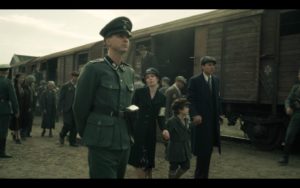 As a nation the Jewish people have seen some of the most horrific injustices and atrocities ever committed against a people group in all of history. From Egypt to Auschwitz and everything in between, we as an audience are reminded that the Hebrews have suffered deeply in the thousands of years since Abraham. One of the most impactful parts of the entire series for me is a short scene where a Jewish woman who survived the Holocaust describes her matchmaking business. She laments that even though in her thirty years of work she has matched so many couples that they have collectively given birth to over nine hundred children, she still has five million nine hundred and ninety nine thousand left to go; she takes on the responsibility of avenging the slaughter of her people personally, just like our heroes.
As a nation the Jewish people have seen some of the most horrific injustices and atrocities ever committed against a people group in all of history. From Egypt to Auschwitz and everything in between, we as an audience are reminded that the Hebrews have suffered deeply in the thousands of years since Abraham. One of the most impactful parts of the entire series for me is a short scene where a Jewish woman who survived the Holocaust describes her matchmaking business. She laments that even though in her thirty years of work she has matched so many couples that they have collectively given birth to over nine hundred children, she still has five million nine hundred and ninety nine thousand left to go; she takes on the responsibility of avenging the slaughter of her people personally, just like our heroes.
This weight of pain and anger is evident in many of the characters, and the visceral nature of their hatred is strikingly relatable. It’s an anger that consumes, and just as Meyer (Pacino) has dedicated years to tracking down and murdering Nazis, so we see the life choices that lead our heroes to get them to where they are, rogue vigilantes hunting and killing other humans. It’s a dark and difficult topic to delve into, and Hunters does it well without being off putting or overly academic.
As Christians, most of us understand just how unrealistic movies and television about vigilantes can be. Almost all of these heroes cause more harm than good, and they all are deeply broken people. Batman is a complexly conflicted figure who has a strict moral code. Iron Man uses his power and intellect to defend humanity but has a hero complex. The Watchmen become hated public figures of vigilante justice, exiled and broken by the government they try to defend. Vigilantes, in reality, often follow their own twisted moral code (usually one that is very violent and heartless) and end up murdering and ultimately get themselves killed. In short, these people are heroes in their own mind and a hazard to everyone around them.
If I myself as a citizen of a government try to take justice into my own hands based upon individual freedoms, I’m communicating a worldview that values my own brand of justice over that of the law. Batman and Spider-Man are just flashy examples of men who use their power to deliver their own kind of justice. Hunters is a show that doesn’t glamorize this activity. As judge, jury, and executioner, the Hunters must suffer the consequences of their brand of justice and revenge. Those of us who follow Jesus know well that God says repeatedly to love your neighbor, and that vengeance belongs to God alone. By seeking vengeance for their people and for their own pain, the Hunters are confessing that vengeance belongs to them alone. God isn’t involved; or if He is, He supports their activity. God alone is the ultimate judge and the ultimate avenger. To try and steal away His vengeance for our own satisfaction is to deny Him glory.
Beloved, never avenge yourselves, but leave it to the wrath of God, for it is written, “Vengeance is mine, I will repay, says the Lord.”
—Romans 12:19
For the Roman Christians, who suffered some of the most unthinkable injustices at the hands of the Roman empire, vengeance was probably a desire for many, at least in some way. But the apostle Paul explicitly warns the people of God to resist taking matters into their own hands. The quote within the verse is a quote from Deutoronomy, which is filled with laws and principles for the Hebrews to follow:
Vengeance is mine, and recompense, for the time when their foot shall slip; for the day of their calamity is at hand, and their doom comes swiftly.
—Deuteronomy 32:35
As hard as it can be to fully accept, God is most glorified in the midst of our mistreatment when we seek His justice and allow Him to carry out righteous judgment upon those who sin against us. As R.C. Sproul puts it, “No one has ever suffered injustice at the hand of God”. What he means by this is that even the worst travesties carried out against humanity, such as the Holocaust, are not injustices that God Himself authors or delights in. God is greatly displeased with those who are “swift to shed blood”, and He takes evil seriously always, even though we may not understand His timing or His methods fully.
 The Bible acknowledges that evil will not go unpunished, but, save for the grace and forgiveness of Jesus, we all are found guilty of evil. In that sense, we as fallen creatures have neither the ability nor the right to exact revenge upon our fellow sinners. Our judgments and our desires for vengeance are not even comparable to the rage and righteous fury that the Lord has for those who sin against Him and His people.
The Bible acknowledges that evil will not go unpunished, but, save for the grace and forgiveness of Jesus, we all are found guilty of evil. In that sense, we as fallen creatures have neither the ability nor the right to exact revenge upon our fellow sinners. Our judgments and our desires for vengeance are not even comparable to the rage and righteous fury that the Lord has for those who sin against Him and His people.
In a broad sense, it’s possible to view Hunters as a kind of study in anti-justice, where the literal “chosen people” of God are so caught up in their own self-righteous rage and hate that they revel in disobeying God’s command to leave the avenging to Him alone. The Hunters, I would argue, are just as lost as their enemies, though for very different reasons.
In summary, I recommend Hunters to the mature Christian who wants to look at the dark side of vengeance and have a pretty enjoyable time doing it. Please exercise caution, as this show is meant for adults and contains graphic images and scenes. If you look a little deeper into the motives of the characters and the themes that are explored, I think you’ll walk away with a better understanding of our sin nature and how even moral people can be tempted to turn to darkness for fulfillment.


